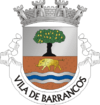Barrancos
| Barrancos | |||
|---|---|---|---|
| Municipality | |||
| |||
 | |||
| Coordinates: 38°07′N 6°58′W / 38.117°N 6.967°WCoordinates: 38°07′N 6°58′W / 38.117°N 6.967°W | |||
| Country |
| ||
| Region | Alentejo | ||
| Subregion | Baixo Alentejo | ||
| Intermunic. comm. | Baixo Alentejo | ||
| District | Beja | ||
| Parishes | 1 | ||
| Government | |||
| • President | António Pica Tereno (CDU) | ||
| Area | |||
| • Total | 168.42 km2 (65.03 sq mi) | ||
| Population (2011) | |||
| • Total | 1,834 | ||
| • Density | 11/km2 (28/sq mi) | ||
| Time zone | WET/WEST (UTC+0/+1) | ||
| Website |
www | ||
Barrancos (Portuguese pronunciation: [bɐˈrɐ̃kuʃ] ou [bɐˈʁɐ̃kuʃ]) is a town and a municipality in Portugal. The population in 2011 was 1,834,[1] in an area of 168.42 km².[2]
The municipality is composed of one parish, being one of the six Portuguese municipalities composed of only one parish, and is located in Beja District, close to the Spanish border.
Among its economic activities are agriculture and livestock rising, being a production center for presunto (dry-cured ham), similar to the jamón ibérico, made from Black Iberian Pig (also known as Porco Alentejano).
The present Mayor is António Pica Tereno, elected by the Unitarian Democratic Coalition.
The municipal holiday is August 28. Barrancos is famous in Portugal for its festival, which takes place each year during the last four days of August, and where traditional bullfighting occurs in the town's main square.
History
The territory where the Barrancos municipality stands today was initially conquered from the Moors in 1167, by Gonçalo Mendes da Maia, and the area's population was ordered by D. Sancho I in 1200. The original municipality was then located in the village of Noudar, which would only be definitively incorporated in the Kingdom of Portugal in the year 1295, when it was granted foral by D. Dinis. Noudar village was extinct in 1825, beginning a slow process of abandonment and migration to Barrancos.
Noudar, with its castle and old village ruins, is today one of the landmarks of the region. It is located 12 km to the northwest of Barrancos.
Dialect
In Barrancos the Barranquenho dialect is spoken.

